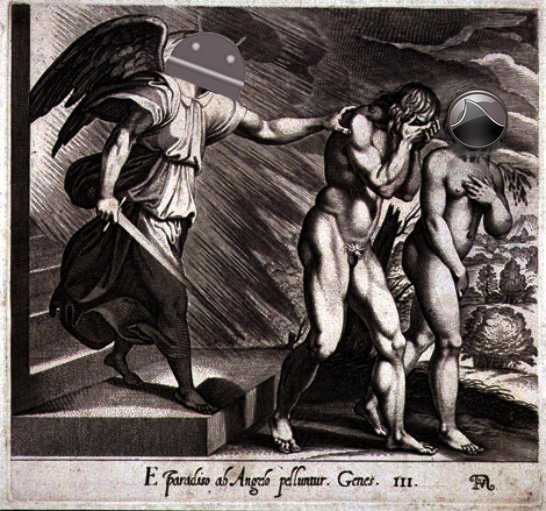
“Woe ye demon possessed, Grooveshark!” shouted Google CEO Larry Page, dabbing his brow with a carefully folded handkerchief. “Thy wanton uploading and fiendish streaming have made a mockery of Law, and now you and your children… nay, your children’s children, are this day banishéd. May your doorsteps forever be pungent from fecal matter.”
Harsh words in 2011, but that’s (roughly) how it went down on Wednesday, when the Grooveshark app was pulled from Android Market e-shelves. Google’s public explanation is that they simply “remove apps from Android Market that violate our terms of service,” but it’s likely that label pressure had a hand in the decision, given Apple’s yanking of Grooveshark from their App Store last August due to complaints from Universal Music Group UK. Grooveshark has since made this statement to Mashable:
We were surprised by Google’s removal of the Grooveshark App from the Android Market Place, and are still unclear as to what policies have now been violated. We have always had a positive relationship with Google as evidenced by the Grooveshark App’s active and featured presence in the Android Marketplace for the past one and a half years.
We respect copyright law and the rights of content owners, generating positive results and revenues for the artists and labels that we have agreements with. Regarding the content for which we do not have agreements in place yet, we abide by, and pay royalties, according to the rules outlined in the DMCA, the same legal act that governs Google and YouTube’s activities.
The music streaming application has been in the doghouse fairly frequently in the last few years, battling lawsuits from monoliths like EMI due to their controversial upload system that allows users to add whatever music they want and share playlists with other users, unlike other streaming apps that force users to listen to a pre-approved Mumford & Sons song after they give a thumbs-up to The Incredible String Band. Grooveshark has avoided litigation in the past by striking up licensing deals with whoever’s angry, which is how the EMI lawsuit was dropped in 2009.
Interestingly, Google’s general counsel Kent Walker testified that same Wednesday before the House Judiciary Intellectual Property Subcommittee in regard to their handling of copyright issues, such as allowing links to piratey material in their search results. As Billboard put it, “[k]nowing [that] Walker would be testifying today, and knowing that Google is negotiating music licensing deals for its pending music service, the industry placed what one source defined as ‘strong political pressure’ on Google to remove from the Android store any objectionable apps.”
Interesting developments, but honestly, how can any of these guys get out of bed, let alone argue over copyright violation, when America’s most wonderful group of all time, LCD Soundsystem, has left us??